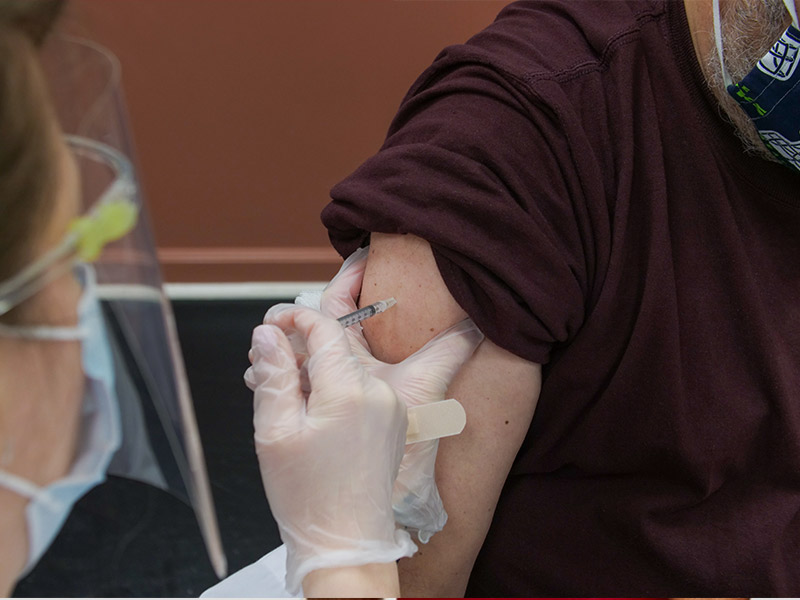
The protection offered by AstraZeneca’s COVID vaccine wanes in three months, a recent study published on Tuesday in The Lancet journal revealed. The vaccine developed by the British-Swedish pharmaceuticals firm in a collaboration with the University of Oxford is known as Covishield in India and is manufactured at Pune’s Serum Institute of India. As India is yet to announce booster shots, this study highlights the need for the same.
Table of Content:-
Findings Of The Study On AstraZeneca’s COVID Vaccine
For this study published in The Lancet, the researchers analysed datasets in Brazil and Scotland.
- Covishield protection against the novel coronavirus wanes in three months, the study revealed.
- In Scotland, the researchers found a fivefold rise in the chance of being hospitalised or dying of COVID-19, after five months as compared to two weeks after getting the second vaccine dose.
- The drop in effectiveness of Covishield was first witnessed three months after getting double vaccinated. It is to be noted here that the COVID-19 vaccine wouldn’t prevent infection but will protect you from suffering from severe COVID infection or death.
- Not only that, the risk of severe infection, hospitalisation increases threefold in just a little less than four months of getting double vaccinated.
- Another crucial aspect of this study is that during the period in which it was undertaken, different strains were dominant in the two countries: Delta in Scotland and Gamma in Brazil. A drop in the effectiveness of the vaccines highlights that it has less to do with the COVID variant and is more about the COVID vaccine.
Also read: From Vaccine Rollout, 2nd Wave To Omicron Variant: How India's COVID Situation Panned Out In 2021
How Was The Study Undertaken?

(Photo Credit: Unsplash)
As stated already, datasets from Brazil and Scotland were analysed for it.
- The data of two million people in Scotland and 42 million in Brazil were analysed for this study.
- The reason why these two countries were chosen might be because the scientists were able to compare the data as the interval between the two doses in both Brazil and Scotland was 12 weeks. Also, those at a higher risk of getting COVID and the healthcare workers were at the front in line to get jabbed.
- The researchers also analysed the vaccine effectiveness at similar fortnightly intervals. This they did by comparing outcomes of people who got vaccinated with those who didn’t.
What Did The Researchers Say

(Photo Credit: Unsplash)
Professor Aziz Sheikh, from the University of Edinburgh, UK was one of the researchers involved in the study.
- Although COVID vaccines have been “a key tool” in the global fight against the pandemic, the drop in their effectiveness is a cause for concern, Professor Sheikh said.
- As this study found out when the vaccine effectiveness first starts to wane, this can help governments to design the booster programmes accordingly, he said. This will ensure that maximum protection is maintained, the professor added.
Professor Srinivasa Vittal Katikireddi from the University of Glasgow, UK, was another researcher involved in this study. He highlighted the need for booster doses.
- The analyses from both Brazil and Scotland reveal the vaccine effectiveness waning over time, he said. The protection significantly drops against severe infection.
- This highlights the need to get boosted after the two doses of AstraZeneca’s vaccine as soon as you can or can, Professor Sheikh added.
Takeaway For India
Covishield, which is AstraZeneca’s COVID vaccine, is one of the two primary vaccines being administered in India, the other being Covaxin, developed by Hyderabad-based Bharat Biotech in a collaboration with the Indian Council of Medical Research (ICMR). A large part of India’s population has received this vaccine. A drop in its effectiveness, as highlighted in the study, reflects the need to start with the booster doses. Although several countries, including the United States, France, and Israel, are administering the booster doses, the Indian government is yet to make any such announcement.
Also, the new Omicron variant is spreading fast. It has already spread to over 100 countries, as per the World Health Organisation (WHO). Vaccines such as those developed by Pfizer and Moderna have shown a drop in efficacy against it. However, a booster dose has proved increased effectiveness. This further highlights why it is so crucial to boost the population after administering the two doses of the COVID vaccines.
Also read: Moderna's COVID-19 Vaccine Booster Shows Effectiveness Against Omicron
About Omicron Variant
Just like any other virus, the novel coronavirus is also mutating. Omicron is a new variant of this virus that is spreading rapidly, raising concerns both over the pressure on the healthcare system it might exert, as well as the effectiveness of various COVID vaccines.
The first case was identified in South Africa on November 9. The WHO classified it as a variant of concern on November 26. India has recorded 214 Omicron cases, government data shows. Hence, it’s not the time to get careless. So, mask up, practise social distancing and get vaccinated for COVID-19.
Photo Credit: Unsplash
Also watch this video
How we keep this article up to date:
We work with experts and keep a close eye on the latest in health and wellness. Whenever there is a new research or helpful information, we update our articles with accurate and useful advice.
Current Version